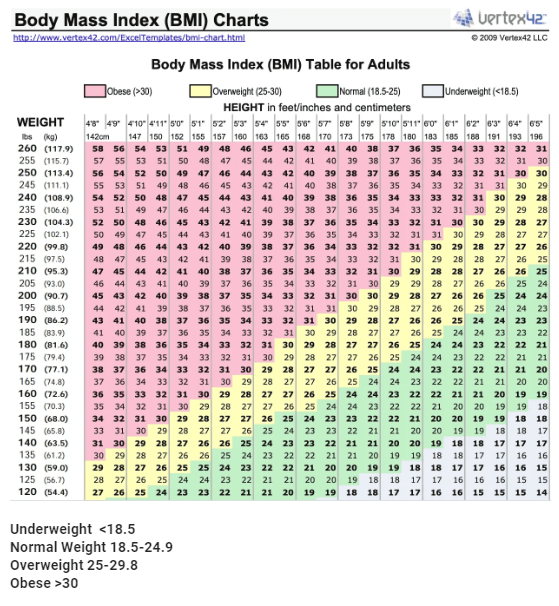When it’s OK to Ignore Your BMI

As a nutrition professional working in health care, it is hard to ignore that BMI has its place when taking into consideration a patient’s overall health. However, BMI was meant to be used to look at general populations and not to box an individual’s total health based on this one number.
Just for a little background, BMI stands for Body Mass Index. It is calculated by dividing your weight (in kilograms) by your height (in meters) squared. And if you don’t already know, here is a table describing what your BMI would be based on your height and weight.

Now, I understand why it’s important to categorize BMI into these different categories, but I find it very frustrating when I have patients come in that absolutely get their mind set on a specific goal weight because of this chart.
There are so many other indicators of health that you can consider, and one of my biggest pet peeves is when individuals start placing their value as a person based on this chart. I am going to give 4 examples when it’s ok to start ignoring your BMI:
1. If You are Very Athletic
You have probably heard that muscle is much more dense than fat and this is true. If you are athletic or muscular, your BMI will tend to be higher and you may be considered “overweight” or “obese”, but obviously you would be much more fit than the general population. This is why it is good to also take waist and hip measurements, as well as full body composition measurements to track your lean body mass and body fat percentage.
2. When you Truly Feel Good and Know You’re Making Healthy Choices
At some point in your weight loss journey, you are going to intuitively eat healthy, enjoy the foods you eat without feeling guilty, and also enjoy being physically active. If you have hit a point in your weight loss journey where your weight has stalled and the only way you have been getting over that hump is to feel chronically hungry and fatigued, then your “healthy” weight may not be what you think it is. Don’t get me wrong, I don’t think the average obese person is at a point where it would be healthy to maintain their current weight, but I do think that it can be healthy to be a few pounds “overweight” or a little curvier depending on your lifestyle and genetics.
3. If it is Affecting your Mental Health
While I work with individuals for healthy weight loss, I obviously take a look at the whole person and not just the number on the scale. If people come to me because they think getting to a magic number on the scale will solve all of their problems, then I have to dig in why this number is so important. Unfortunately, diet culture bombardes us with impossible body standards, extreme diets, and weight loss products (that usually don’t work), but I try to work on giving patients the building blocks they need so they can have a healthy relationship with food while still reaching a healthy weight FOR THEM. If you find yourself obsessing over the scale and making choices when it comes to food or exercise that you know aren’t beneficial for your mental or physical health, then you may need to reflect on why that number is so important to you.
4. When Looking at Other Health Markers
Yes, weight has its place as an indicator for health, but let’s think about other indicators of health that should be considered. If you are a “healthy weight”, but your blood sugars are out of control, you have elevated blood pressure, or high cholesterol, then you probably need to talk to your doctor or dietitian on ways to make diet and lifestyle changes. Just because someone looks healthy on the outside, does not mean their behaviors are healthy, and this will be reflected in other ways besides a BMI chart.
So as you can see, the BMI has its place in health care but it doesn’t always reflect how YOU as an individual should weigh, and shouldn’t be used to make you feel “lesser than” when trying to reach your health goals. Please consider reaching out if you think you need help making healthy and sustainable changes in your life so you can reach your own nutrition goals!
Jordan Chen, MS, RDN
rdn@manhattannutritionclinic.com
785-236-9607












